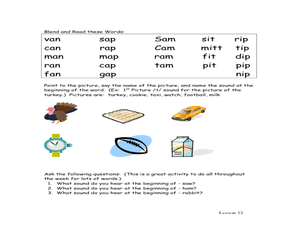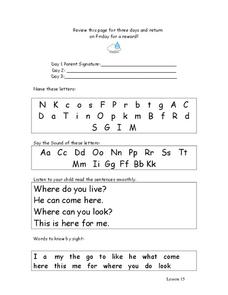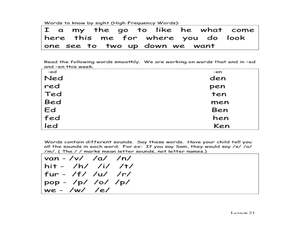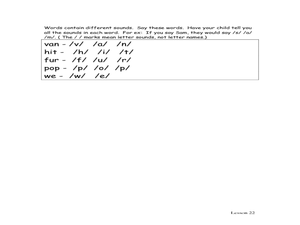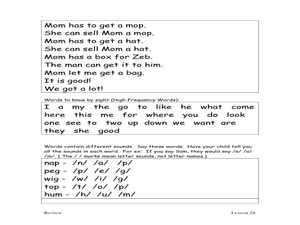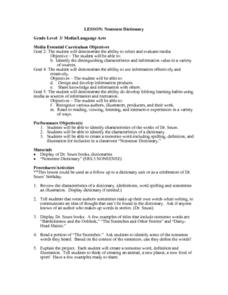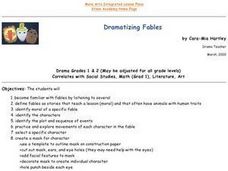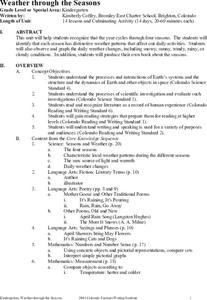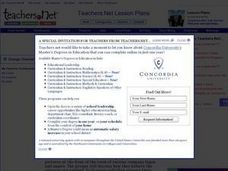Curated OER
Letter and Word Review
In this letters and word review learning exercise, students name letters, read sentences, read words, name pictures, and more. Students complete 7 exercises total.
Curated OER
Letter and Sight Word Review
In this letter and sight word activity, students practice naming letters, saying sounds, reading simple sentences and blending and reading words.
Curated OER
Word and Letter Practice #10
In this word and letter practice activity, students say letters and sounds of letters, practice reading simple sentences and sight words, then say names of pictures and say the beginning sound of each.
Curated OER
Word and Letter Practice #5
In this word and letter practice worksheet, students name given letters, say sounds, read simple sentences, and practice sight words and blending.
Curated OER
Identify letters and sounds
In this letters, words, and sounds instructional activity, students say sounds, identify letters, read sentences, read words, and read -ed and -en words. Students complete 6 activities total.
Curated OER
Review letters and words: 22
For this review letters and words worksheet, learners name letters, name sounds of letters, read words, and more. Students complete 5 exercises.
Curated OER
Letter/Word Recognition Worksheet
In this letter recognition worksheet, students identify the given letters and say the sounds of the letters. Students practice saying 28 sight words and 14 sentences.
Curated OER
Words and Letters Practice #11
In this word and letter practice worksheet, students practice saying letters and sounds of letters, read simple sentences, and practice high frequency sight words.
Curated OER
Word and Letter Practice
In this word and letter practice worksheet, students name letters, say sounds, read simple sentences, and practice a set of sight words.
Curated OER
Word and Letter Practice #2
For this words and letters practice worksheet, students practice naming letters and practicing sounds of given sets of letters, read simple sentences, and practice sight words.
Curated OER
"Robin Hood"
In this "Robin Hood" worksheet, students, with a partner, discuss the differences in meaning between rob and steal, match eight words associated with Robin Hood and match six words/phrases with their proper definitions.
Curated OER
Shakespeare and the Web
Twelfth graders gain a better understanding of Shakespeare through lecture and the Internet.
Curated OER
WHY THE WEST IS BURNING
Students use the Internet to access a passage and identify cause-and-effect relationships. This activity provides practice for the Florida Comprehensive Assessment Test (FCAT).
Curated OER
Nonsense Dictionary
Third graders explore various media. They identify the characteristics of various sources and use that material effectively. Students identify the characteristics of Dr. Seuss' work and the characteristics of a dictionary. They create a...
Curated OER
Secret Stories: Exploring the Elements of Folktales and Fables
Students are introduced to the characteristics of fables and folktales. In groups, they read and identify the various elements in the stories they read from around the world. For each story, they analyze the setting and the various...
Curated OER
Dramatizing Fables
Students familiarize themselves with fables by listening to several of them. They define fables. They identify the moral of a specific fable. They identify characters, plot and sequence of events. They create a mask of a character in a...
Curated OER
guided reading using OWLS
Students complete activities based on All About Owls written by Jim Arnosky, Owl At Home written by Arnold Lobel, and Owl Moon written by Jane Yolen.
Curated OER
Making a Speech
Fourth graders make a five minute speech on the life of a famous person.
Curated OER
Weather through the Seasons
Students examine the year's cycles by observing the four seasons, their distinctive weather patterns that affect our activities and the weather changes that each brings. The fourteen lessons of this unit offer a good opportunity for the...
Curated OER
Fantasy, Fables, Myths, Legends & Fairy Tales
Students identify the differences between fantasies, fables, myths, legends and fairy tales. In groups, they create their own versions of the different genres. They practice identifying the examples, as well.
Curated OER
Impact of Greek Mythology in Today's World
Students explore world logos and names of companies and relate them to Greek myths. Events real and imagined are examined and their effects on later cultures are discussed.
Curated OER
From Graphic Organizer to Comparison
Fifth graders brainstorm a variety of topics for writing. As a class, learners create four types of graphic organizers on selected topics. They discuss how to use graphic organizer in constructing a written paragraph.
Curated OER
Rhetorical Devices
Eleventh graders consider rhetorical devices in speeches and then make an informed selection of effective rhetorical devices for a controversial topic presentation. Students present their findings using presentation software.
Curated OER
What's My Point?
Sixth graders move through the process of defining persuasion, identifying persuasive arguments and techniques in writing and evaluating their own use of accurate details. Students also define an author's point of view.



